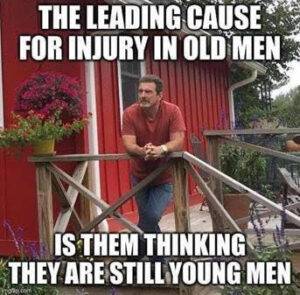We cannot control our future … but our Faith built on acts of kindness builds a future with God = all will be well
 Life – despite our best plans and preparations – often twists and turns without much warning. I mean, how did I end up 60 years of age so fast? There’s a funny picture around indicating that the leading cause of injury in older men is because they still think they are young men.
Life – despite our best plans and preparations – often twists and turns without much warning. I mean, how did I end up 60 years of age so fast? There’s a funny picture around indicating that the leading cause of injury in older men is because they still think they are young men.
It might seem strange to say that, but the world is very busy distracting us from reality, helping us to avoid death, and remove pain as fast and easy as possible. Building a Tower of Babel. Not accepting reality, and altering our lives to suit new realities, leads to disaster and pain.
Let’s start with a bit of background. In the 1st Reading, the Apostles are fresh out of goal for the second time with God’s help – but choose to front up to the Court of Elders (the Sanhedrin), and explain why they are preaching about the Resurrection. They could have avoided it.
Do we avoid confronting false realities in our community and challenging politicians? Our future (and our children’s future), depends on the triumph of truth and goodness.
In part one of the Gospel, the 153 fish is explained by experts to mean either: the number of fish species, or the number of the nations, in the world at that time.
Symbolically it means God is here for everybody not just a few. This is further strengthened by the additional information that the net was not broken: meaning God has time for all of us. We only need to choose to be part of the great love affair that God has with the world and us.
In part two of the Gospel, we recall Peter’s denial of Christ three times and, now, Jesus gives him three chances to express his love for Christ: the Resurrection means God loves us.
This encourages us to know that we can always try to undo our mistakes by performing acts of charity to anyone – not just the person we might have wronged (eg. they may have died).
In the final part 3 of the Gospel, Jesus tells Peter that, as he grows older, he will have less say and control about where he goes and what he does. This is especially true for married people as their families develop and various challenges arise through sickness and lifestyle choices.
Now, let’s reflect on the issue of “control” in our lives. Most of us try to be in control. It gives us peace of mind and takes away fear.
But are we in control, really? Can we prevent accidents or sickness, or stock market crashes or a greedy Government attacking our country? We can take precautions and make wise choices.
While it’s true that material possessions and money can help improve our security and control, we do need something more to cope when our world turns upside down.
The reality of life is that it is always changing. We cannot be a child forever. Teenagers must leave home and work to live. Love requires sacrifice. Old age forces us to lose freedoms (eg. stop driving, use a wheelchair/ walker, etc.). We only have limited control in life.
We can see the effects of the current war in Ukraine, and it’s less obvious effects in other countries like Kenya (fuel prices up = food prices up).
For those who don’t believe in God, they must work very hard to control their present and future: and that’s stressful! Perhaps the cause of so much mental and physical sickness today?
Whereas those with stronger Faith, have more peace as we do our best, and trust that God will do the rest; especially in the midst of our struggles and unexpected life changes.
In less wealthy countries, with no social security, people face so many unexpected twists and turns in life that they understand what I mean. A family member’s funeral/ sickness, loss of work, Univ. Teachers going on a long strike after tuition fees were paid and wasting money on rental agreements. The house burning down? Someone stealing your phone or belongings?
How do people in less wealthy countries cope? They cope by being kind to each other every day – especially when someone has lost something. The extended family and community chip in to help when things go wrong. Their social security is their community rather than money.
These are Jesus’ two commandments: love God and love your neighbour = one and the same. We love God by loving our neighbour. As we love our neighbour, our trust in God increases.
The Resurrection reminds us that God is present in our lives, and has overcome death. This helps us live in Hope and not in fear for tomorrow: because God loves you.
HAPPY EASTER!
By Gerard Conlan, OMI


